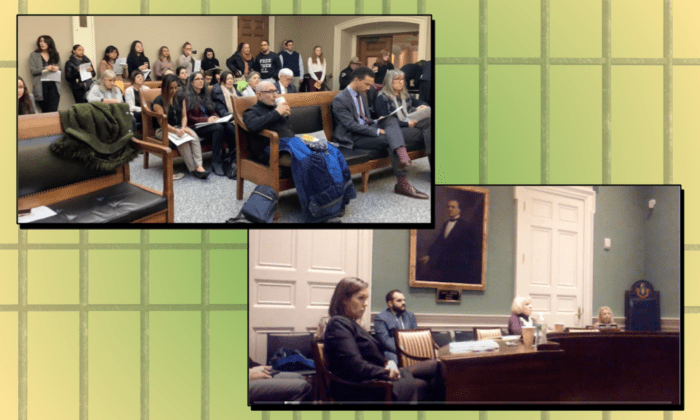It was Tamir Rice’s death in 2014 that got my colleague and I to stand out in front of the college where we taught, with signs, protesting the death by police of yet another black man.
#BlackLivesMatter had been a rallying cry for some time in cities across the country and in some smaller towns, but we felt at our community college, the students, immersed in their own struggles, needed to be reminded about a movement that was shaking up the nation. Just a few months before, Eric Garner’s last words, “I can’t breathe” had been blasted across our consciosuness. His name too was on our signs.
A famous video had caught the horrific death of Garner as he was thrown to the ground by Officer Daniel Panteleo.
A screenshot of the tackled Garner by police
It seemed impossible to believe that the Staten Island grand jury did not indict NYPD police officer Daniel Pantaleo on December 3, but then I am a white woman and have not lived with such racist attacks on my body, my family, or my community. Crowds in New York City and San Francisco gathered in protest. I joined thousands in downtown Boston who gathered on the Boston Common, and then marched in the downtown area. Many blocked traffic, trying desperately to bring America’s attention to the injustice of this.
The documentary, American Trial: The Eric Garner Story also tries to show the injustice of this time in our recent history. It calls itself “an unscripted courtroom drama” as it presents the case against NYPD officer Panteleo. It is effective in building tension, making us, the audience want a verdict of “Guilty” but it does not provide an answer. Instead after the trial, it invites the audience to make its own decision. I found this a bit unsatisfying but it’s a good marketing tool, driving an audience to decide.
If you watch the film on the 20-21st, you can vote on the verdict via online ballot here. Results will be announced May 21 during a Livestream Q&A with director Roee Messinger and Esaw Snipes Garner, Garner’s widow. Otherwise, the film has a limited run and you can find event listings here.
But in spite of its open ended approach to the trial that never happened, the documentary is worth watching. It presents an incredibly realistic trial and uses defense attorneys, retired cops, one of the medical experts who consulted on the case, a good friend of Garner’s and a very honest and heart-broken Esaw Snipes Garner. An actor, Anthony Altieri, plays Pantaleo and is fairly neutral intentionally. You don’t hate him exactly but you see how he is part of a larger system that has no interest in justice.
The documentary reminds us of the ways the criminal legal system twists words, justifies actions, and turns truth on its head so easily. Especially when it involves the life of an unarmed Black young man.
Is NYPD Officer Daniel Pantaleo guilty as charged? Is this really a question?
Today, May 20th, would have been Michael Brown’s twenty-fourth birthday.




